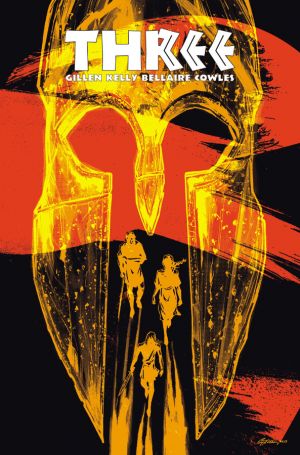Progressive Panels
Kieron Gillen's Three #1 and Frank Miller's 300: History as Text in The Hands of The Writer
By Andy Frisk
October 12, 2013 - 21:55
Image Comics
Frank Miller's vaguely (and controversially deemed) fascistic masterpiece 300, and it's big screen interpretation, have pretty much forever emblazoned an idealized (i.e. fictional) image of self sacrificing Spartan warriors battling against the seemingly uneducated hordes of "Persia" (who look more African than Persian even though they are Middle Eastern) for the freedom of all of the Western World. It's sad that the average American today is uneducated enough to take the fictional 300 as historical fact. They say that history is a text though...and the best extremists are often the best at re-writing, or at least attempting to re-write, history. Miller conveniently left out many facts relating to Spartan life in ancient Greece. Spartans were only great warriors because their entire ruling class, which comprised a very tiny percentage of their population, was supported by the work of slaves called Helots. These slaves were kept in their place through annual Helot hunts where Spartan warriors would randomly hunt and kill innocent Helots as they toiled in the fields or slept. Thus, through a reign of terror, or threat of terror, the small percentage of Spartan rulers kept their huddled masses in check. (Sound familiar to anything going on contemporary? It should.) Helots didn't just support the Spartan economy and way of life though. They were often forced into military servitude. You see, Spartans DIDN'T carry their shields to battle. Their personal Helot slaves did.
It's dangerous to idealize any ancient culture, and present it as an example for contemporary action and thought. The very act of doing so is so regressive in nature that it borders upon propaganda. In many ways, 300 is nothing but a simple action/adventure story for boys. Much like the whole story of Thermopylae is, as writer Kieron Gillen states in his afterword to the first issue of his new series from Image Comics titled THREE. While Gillen himself states very expressly in the same afterword that he doesn't "come to bury" Sparta with THREE, he definitely is doing historicity and progressivism a service by balancing out the rosy colored view of Sparta brought to life by Miller with a bit of realistic black and white. Yes, Leonidas might kick ass, but Gillen reminds us that he most likely kicked (i.e. wantonly killed) some of Sparta's Helots (who were culturally deemed as subhuman) before he ever took a stab at a Persian Immortal.
It is a sad fact of history that many societies, ancient and not so ancient (consider the Antebellum American South), utilized slave labor to support their upper class' economy and culture. Sparta wasn't the only one by a long shot. It's rare that you see stories about the intellectual achievements of Athens though, achievements that contributed much more to the development of the Western World than Sparta's militaristic society did. Sparta, with its constantly war ready action adventurers, is ready made and rife with eye catching storytelling themes and potentials. In a more colloquial sense: Sparta is just more cool than the rest of the Greek city states as far as adolescent boy appeal is concerned. 300, the film, was no doubt a spectacular and visually dazzling film. A thought piece about Athenian philosophers, so wrapped up in their debates and philosophical puzzles that they don't flee the breaching of their very city state's walls, wouldn't do much to capture the imagination of 13 year old boys (especially if they hate math). This makes any presentation of Spartans as semiotic superhuman warriors dangerous if taken out of context. Society doesn't advance through war alone. In fact a warlike existence should be a last resort. Nevertheless, war sometimes is a necessity. Consider the Allied war against the Axis during World War II. Even the actions of the Spartans at Thermopylae can be considered necessary on the part of the Spartan because their way of life (however repugnant to enlightened eyes) WAS at stake. The problem with 300 is in its presentation of the Spartans as Ubermensch.
In THREE #1 Gillen, again with no specific intent to attack or devalue Miller's 300, presents a much more realistic view of Spartan life. His Spartans are great warriors as well. They are a proud, regal, and powerful group of men and warriors. Here though, the actions of the characters, characters not unlike the historical Leonidas himself, are shown without the benefit of the aforementioned rose colored filter. They viciously hunt, kill, and debase the Helots that they come across in Lakonia. One of the "three" referred to in the series' title, a Helot named Terpander (who himself is not an idealized character as well), is blessed with a silver tongue that ends up getting himself and several of his fellow Helots into mortal danger at the hands of traveling Spartan warriors. He sarcastically attacks the Spartan warrior Arimnestos verbally. This leads to the mortal danger that THREE #1's starring group of Helots faces. Gillen does have a message here though. The Spartans were fascistic overlords, and their slaves were little more than "apes who spout history," (as Arimnestos refers to Terpander as being) to the Spartans. It would be hard to cheer on Leonidas against the Persian "barbarians" if he would have been observed engaging in such behavior, which history ensures would have most likely been the case, given the Spartan culture that Leonidas was raised in.
Gillen's portrayal of Terpander isn't rose colored either though. His actions cause the deaths of many innocent Helot men, women, and children. Whether he views them as necessary sacrifices to his motivations (either that of demonizing the Spartans even further-or selfishly insulting Arimnestos for his own pleasure) or not, he doesn't have the right to force their lives into forfeiture without their willing consent to his revolutionary (or personal) ambitions. Gillen masterfully tells a morally ambiguous story that is way more historically accurate than anything Frank Miller has ever told. History is, by its very nature, a morally ambiguous tale itself when retold, interpreted, or fictionalized in an honest and unbiased way.
THREE, through the sheer power of Gillen's advanced storytelling ability, will easily be seen as a greater work than Miller's 300 in the eyes of future critics as it is more than a tale for adolescent boys (and the adolescent boys that still exist deep inside adult men). It is a tale that is much more complex, and therefore much more accurate. It should be required reading for anyone who has read, and themselves over idealized, Frank Miller's 300. It is a worthy sequential art tale that balances out the biased historical text that Frank Miller has so profited from.
Related Articles:
300 Rise of an Empire Movie Review
Kieron Gillen's Three #1 and Frank Miller's 300: History as Text in The Hands of The Writer
Alien Pig Farm 3000
Advertising Banner 300 x 250
Meet the Spartans : 300's Sequel
300 Another Review
300 - Historical Fiction for Males
Frank Miller's 300
300 One More Review
300 Movie Review



